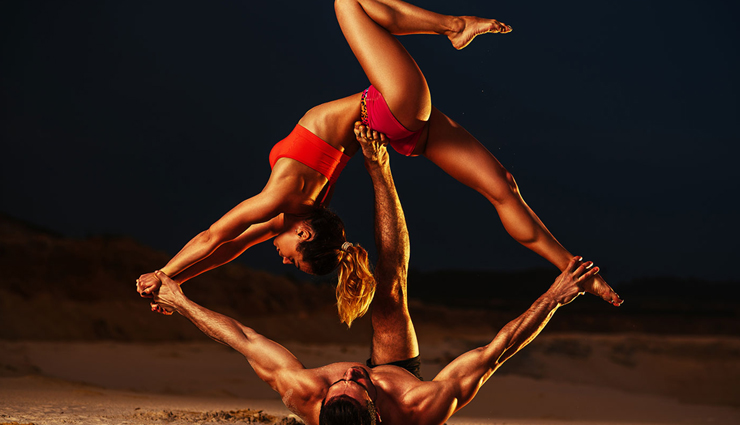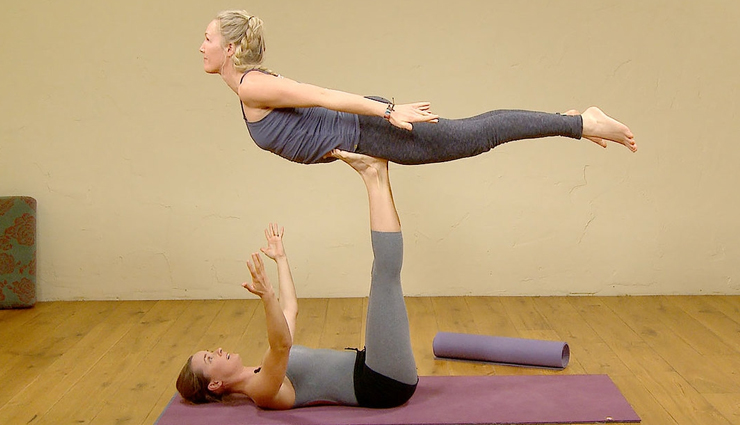5 Acro Poses To Maintain Healthy Body

This practice entails engaging with a partner, establishing trust, and mutually supporting each other during various poses. Acro Yoga places a strong emphasis on continuous verbal communication, which sets it apart from individual yoga practice where you predominantly work in solitude.
Acro Yoga is fundamentally about teamwork, fluidity, and nurturing partnerships. Through the integration of movement, interpersonal connection, and a sense of playfulness, Acro Yoga proves to be exceptionally beneficial and inspirational.
One of the earliest documented instances of Acro Yoga dates back to the late 1930s when the renowned yoga guru Tirumalai Krishnamacharya showcased it, partnering with a child. This practice has evolved considerably since then.
In Acro Yoga, there are three primary roles: the base, the flyer, and the spotter. The base typically lies flat on the ground with their back in contact with the earth. The flyer is the individual elevated by the support of the base, while the spotter closely observes, ensuring a safe landing for the flyer when they return to the ground.

To begin, the base should assume a supine position with legs extended parallel to each other. Bend the knees and rest the soles of your feet on the ground. The flyer, on the other hand, should position themselves near the base's feet. The base will then raise their feet and position them on the flyer's hips.
Following this, the base should grasp the flyer's arms at their elbows and extend their legs upward, gently lifting the flyer. At this point, the flyer should focus on maintaining balance, keeping their toes pointed outward. Subsequently, the base can release their support, and the flyer can extend their arms into a flying position.
The base should recline on their back on the floor. The flyer should position themselves at the head of the base and establish a handhold. Subsequently, the base ought to elevate their legs from the floor, orienting the soles of their feet toward the sky. Following this, the flyer should lean forward and rest their shoulders on the base's feet. The flyer can then raise their hips and feet into an elevated position.
The base assumes a supine position on the ground, with knees bent and the soles of the feet pointing skyward. Maintain a shoulder-width gap between the feet. The flyer positions themselves in front of the base, near the base's feet.
Position the soles of the base's feet on the upper thighs of the flyer, pressing the full length of the foot upward, with the toes reaching the lower rib cage of the flyer. Next, the base securely holds the flyer's hands and extends their knees, lifting the flyer into an elevated position.
For added safety, a spotter can assist as the flyer bends her knees and wraps them around the front of the base's legs. The flyer then elevates her torso and releases her grip on the base's hands, subsequently wrapping her feet around the base's calf muscles.
The base's feet should be positioned on the middle of the flyer's thighs. The flyer straightens her back, sits upright, and extends her arms outward.
The base initiates the sequence by assuming the Dandasana, or Staff Pose, position. For the fundamental inversion, the flyer should position her back towards the back of the base's legs. The base then bends his knees, allowing the flyer's buttocks to rest comfortably on the soles of his feet.
As part of this posture, the flyer should extend her arms backward, with palms facing outward and reaching for the base's hands. The flyer should arch her back, while the base extends his legs, gently lifting the flyer.
Following this, the flyer should straighten her left leg while bending the right one. She should also lean backward, achieving a semi-backbend posture, and release her grip on the base's hands, allowing her to spread her arms outward.
The base lies on the ground, facing upward, and raises his legs with the feet pointing towards the sky. The flyer positions herself near the base's shoulder, facing away from the base, and maintains a hip-width stance with her feet.
Next, the base should grasp the flyer's ankles and draw her knees towards his chest, creating a comfortable position for the flyer to lean backward onto the base's feet.
The base should place the soles of his feet on the flyer's shoulders, with the length of his feet extending downward to cover the shoulder blades and mid-back of the flyer.
Now, working in tandem, the base and flyer should elevate the flyer by extending the base's legs and raising the flyer using the base's grip on her ankles.
The flyer should extend her arms and, with the base's assistance, maintain her ankles aligned with her hips.